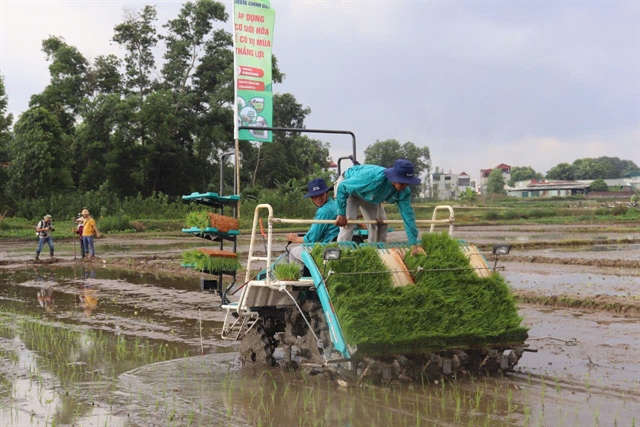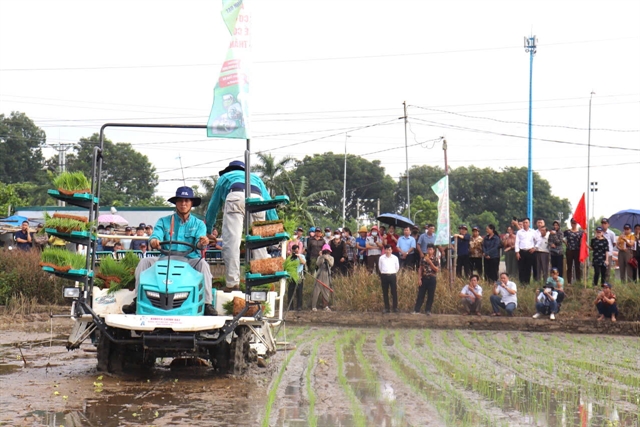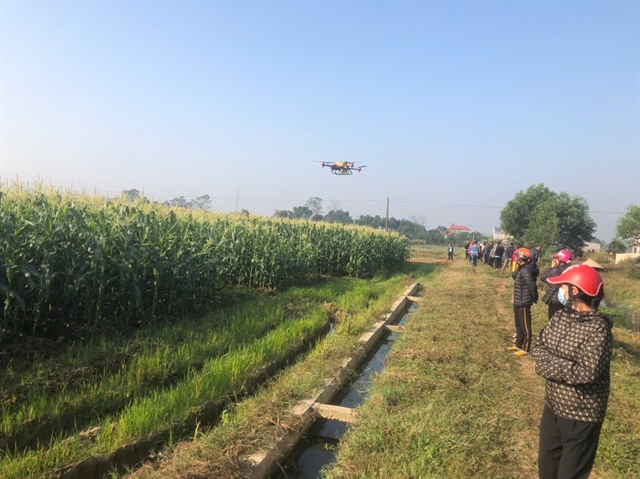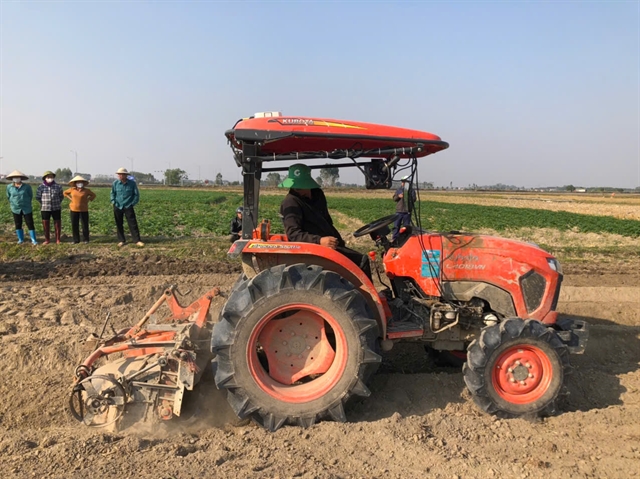 Life & Style
Life & Style


|
| Farmers transplant rice by a machine. — VNA/VNS Photos |
BẮC GIANG — The northern province of Bắc Giang is promoting the application of digital transformation and scientific and technological advances in agricultural production.
Mai Sơn, Vice Chairman of the Bắc Giang Provincial People's Committee said the province is developing high-tech agriculture with a focus on urban agriculture, smart agriculture, and precision agriculture.
This involves applying information technology and digital technology to agricultural and non-agricultural products, as well as services that leverage local advantages, in line with the province's OCOP programme.
In addition, the province is building a model for linking aquatic products, connecting production to smart agriculture, and integrating production with product consumption.
Digital technology is being applied to automate intensive aquaculture production as part of the project 'Developing Automation in Intensive Aquaculture in Bắc Giang Province from 2021 to 2025'.
Bắc Giang is also developing an information system and specialised database for agricultural and rural management. This includes constructing a database on key agricultural products and their growing areas, as well as databases on dike and irrigation works.
The province is building and developing an information system and database on livestock farming, along with software for managing food safety and hygiene certificates and inspection results.
Furthermore, Bắc Giang has digitised 45 fruit-growing areas, focusing on the province's key export products such as lychee, longan, orange, and grapefruit. The province has also updated its plant disease monitoring database within the national database system managed by the Plant Protection Department.

|
| Bắc Giang Province is promoting the application of digital transformation and scientific and technological advances in agricultural production. |
To ensure connectivity, integration, and data sharing, the province’s Smart City Intelligent Operation Centre (IOC) is linked to the national database system for agriculture and rural development, facilitating management and operations.
By 2025, Bắc Giang plans to continue deploying the Centre for Monitoring, Operating and Managing Forest Protection, ensuring connection to the IOC to support the leadership and direction of all levels and sectors.
As part of the project to support sustainable fruit tree development (2021-2025), the provincial Department of Agriculture and Rural Development has digitised 212 concentrated fruit tree growing areas. The province has synchronised its forest resources and forestry land database with the national forestry sector management information system.
In addition, Bắc Giang has developed and deployed various digital transformation models in agricultural production, including a model applying biofloc technology to intensive tilapia farming on a scale of 2ha, and a model using biotechnology to raise Amur fish with 100 per cent industrial feed on a scale of 1ha in Hoàng Vân commune, Hiệp Hòa district.
There is also a model utilising drones for pest and disease prevention in rice production according to VietGAP standards in Dương Đức Commune, Lạng Giang District, and Tự Lạn Commune, Việt Yên District, covering a scale of 34ha with 307 participating households.
Additionally, drones are being used for pest and disease prevention in lychee production for 12 participating households on 10ha in Lạng Giang District.

|
| Bắc Giang has a model utilising drones for pest and disease prevention in rice production according to VietGAP standards. |
From 2021 to the present, Bắc Giang has showcased over 100 OCOP products at the Virtual Reality Exhibition Fair during the International Forum on Digital Transformation of Vietnamese Agriculture, promoting and introducing these products.
The province has created QR codes and product traceability stamps for 42 co-operatives and enterprises, and has also built virtual space booths on e-commerce platforms for 37 co-operatives.
The provincial Department of Agriculture and Rural Development is continuing to maintain its information system and databases on livestock, food safety certificates, and inspection results, as well as databases on aquatic products.
They are also working on establishing a centre for monitoring, managing, and protecting forests by installing surveillance cameras and fire warning systems at key locations. The irrigation works database is being updated on the common GIS platform of the province, and a database on key agricultural products and growing areas is being integrated into the province's common GIS system.
According to Lê Bá Thành, Deputy Director of the Department of Agriculture and Environment of Bắc Giang, the local agricultural sector will focus on prioritising resources to deploy and build pilot models of digital transformation in cultivation, livestock and forestry to create successful examples for replication in other fields.
The province will further enhance and diversify methods of communication and training to raise awareness among officials and the public about the importance and inevitable trend of digital transformation, encouraging farmers to use electronic devices to transition from manual to technology-driven production practices.
Nguyễn Văn Tuyền, Vice Chairman of the People's Committee of Yên Thế District, said: "Currently, over 50 per cent of our products have been placed on e-commerce platforms.
"By applying digital technology, we have tracked all OCOP products through digital records that meet OCOP standards. All of our OCOP products are now sold on e-commerce platforms."

|
| Bắc Giang has developed and deployed various digital transformation models in agricultural production. |
Trần Thị Thu Trang, Deputy Director of Yên Dũng Clean Vegetable Co-operative said: “Using computers to automate daily watering saves significant labour and ensures high accuracy in watering each plant.
"Consequently, the plants grown in greenhouses and membrane houses are very uniform due to the consistent amount of fertiliser and nutrients delivered during watering.”
Đặng Văn Tặng, Head of the Department of Cultivation and Plant Protection, said: “We are working on building a database in cultivation to update information on area, productivity, output, and quality of crops in Bắc Giang Province.
"This will facilitate management and direction from provincial to grassroots levels. We have issued codes for growing areas and digitised concentrated fruit tree production areas of 10ha to ensure traceability for export purposes. In intensive cultivation and care of crops, we have developed and replicated high-tech agricultural production models.” VNS




